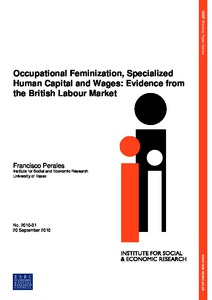Occupational feminization, specialized human capital and wages: evidence from the British labour market
"Research has consistently demonstrated a negative and significant relationship between occupational feminization and wages. This has traditionally been attributed to societal mechanisms undervaluing the work mainly performed by women. More recently, empirical evidence from the US and Europe ha...
| Main Author: | |
|---|---|
| Institution: | ETUI-European Trade Union Institute |
| Format: | TEXT |
| Language: | English |
| Published: |
Colchester
2010
ISER |
| Subjects: | |
| Online Access: | https://www.labourline.org/KENTIKA-19183827124919010099-occupational-feminization,-spe.htm |
| Summary: | "Research has consistently demonstrated a negative and significant relationship between occupational feminization and wages. This has traditionally been attributed to societal mechanisms undervaluing the work mainly performed by women. More recently, empirical evidence from the US and Europe has supported theories based on the concept of specialized human capital. We examine whether lower wages in female-dominated occupations in Britain are explained by differences in specialized human capital, allowing for other potentially mediating factors. We also explore the functional form of the relationship between occupational feminization and wages and estimate the contribution of occupational sex-segregation to the gender pay-gap." |
|---|---|
| Physical Description: | 49 p. Digital |

